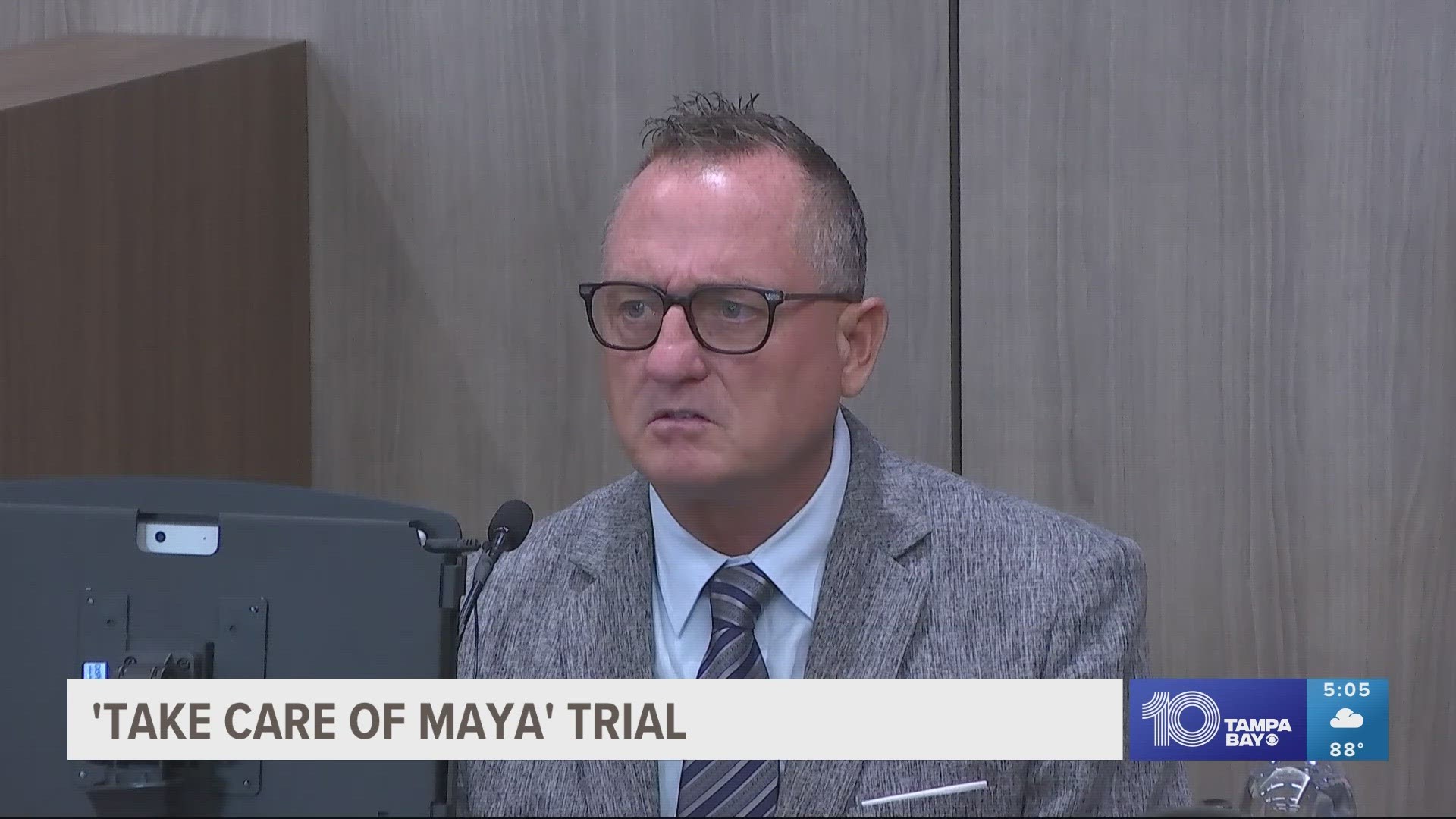VENICE, Fla. — There's a new testimony in the case of a Venice family that is suing Johns Hopkins All Children's Hospital for $220 million.
The Kowalski family's lawsuit against the hospital centers around allegations of malpractice, false imprisonment, battery, medical negligence and emotional distress. The family's ordeal is featured in a top Netflix documentary "Take Care of Maya."
The main plaintiff in the case, Maya's father Jack Kowalski, returned to the stand to continue testifying for a second day and tell his side of the story to jurors. Just the day before he had spoken about the events that led up to his wife Beata's suicide.
The family claims that the hospital staff and the Department of Children and Families levied allegations of child abuse against Maya's mother. They also accused her of Munchausen Syndrome by Proxy and over-medicating Maya whose doctors were treating her for a rare condition called complex regional pain syndrome. A judge then ordered Maya to be sheltered at the hospital and was kept away from her family for 87 days.
The lawsuit stated that this "extreme and outrageous" conduct caused Maya's mother, Beata Kowalski, to take her own life.
Jack Kowalski is hoping to bring this seven-year-long battle with entities related to the case including the hospital to an end with a court ruling in his family's favor.
His testimony highlighted surveillance videos taken of his then-10-year-old daughter without parental consent.
"It was a one-sided story and if we had that at the time, we would not be here," Jack Kowalski said. "She was trying to use her arms as much as possible that's not a child faking."
Jack Kowalski spoke of his interaction with hospital staff, Dr. Sallie Smith of Child Protective Services and even the moment Maya was taken into state custody.
Jack Kowalski also said the hospital did not allow some of Maya's doctors to see her or allow gifts from her family including Holy Communion.
He also said that at different times even when he was on his visitation with Maya, he was threatened with arrest and on one occasion was interrogated by a Sarasota County Sheriff's deputy without his counsel.
Evidence in court also showed the hospital billed Jack Kowalski's insurance using the code for treating complex regional pain syndrome.
The Kowalski family said this was fraudulent and ran contrary to the conclusion of hospital staff that Maya's symptoms were fake or due to Munchausen Syndrome by Proxy on the part of her mother. He said the fact that this was still in Maya's record would have an impact on her as she had to live with and manage her condition which presents differently depending on the nature of a flare-up.
"Because it's in her record, it still shows conversion disorder or fictitious disorder. Somebody could take this right away and say, 'Oh, this girl is faking,' and not get the proper treatment and that is disgusting," Jack Kowalski said.
There were a few tense moments in the Sarasota courtroom and several punctuations to proceedings including a twist that saw two motions for a mistrial from each side. The jurors were escorted in and out a few times while counsels approached the bench to discuss matters with the judge.
During a portion of the testimony, the first motion for mistrial was presented by the defense in relation to secret surveillance video from the hospital that a former attorney for the Kowalski's was unable to access prior to a dependency hearing in November 2016.
They argued that a statement by Jack Kowalski, that having that video available to the judge during that hearing would have made a difference, prejudiced the jury because that action was part of a CPS order. The judge had precluded matters related to the CPS orders from this case because staff were obligated to follow them and Johns Hopkins could not be liable for that.
The second by the plaintiff was in reference to the judge denying the introduction of what appeared to be newly discovered allegations of sexual abuse. The judge also denied that motion and reaffirmed his ruling not to allow that into the case because there was no understood violation to the plaintiff.
In a statement sent to 10 Tampa Bay, Johns Hopkins responded to the allegations of a discovery of a possible sexual abuse incident.
“The new allegations raised by the Kowalski family’s attorneys were a complete surprise to Johns Hopkins All Children’s Hospital. As soon as we became aware of the allegations, and in accordance with our policies, we promptly initiated an investigation. While ongoing litigation and strict federal privacy laws restrict us from sharing more at this time, we take allegations of this nature very seriously and always put the safety of our patients above all else,” according to the statement from a spokesperson for the hospital.
Cross-examination saw the defense team taking Jack Kowalski through his daughter's medical records, emails and blog posts by his late wife Beata documenting the process of Maya's care and treatment. Questions centered on the ketamine treatment the family sought in Mexico and Beata's frequent requests to medical personnel to administer the drug to her daughter.
One of Maya's primary doctors who recommended and carried out the ketamine treatment, Dr. Anthony Kirkpatrick, was initially scheduled to take the stand on Tuesday. However, his testimony had to be moved because he was unwell and unable to make it to court, according to Jack Kowalski's attorney.
Maya is expected to take to the stand again, this time before the jury, to testify as a witness in the case later this week.
She was first on the stand last week to authenticate a letter she had written to her parents about her condition at the hospital that was part of the evidentiary presentation. The jury was not seated for that.

